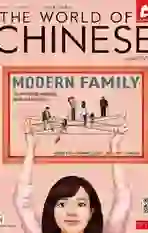BABY,COME BACK
2018-10-20REBECCALONGOKURAHATTYLIU
REBECCA LONG OKURA HATTY LIU
As China regulates international adoption, attitudes at home make it difficult for domestic adopters
On a cold morning in November 2017, 18-month-old Zhang Liwei was bundled into a car with two guardians, some cookies, a bottle, and a small toy. Arriving at a concrete building in Hefei, Anhui province, orphanage workers pointed Liwei at Sarah, a childless American woman with blonde highlights and glasses, and told him: “Mama.”
“It is such a surreal experience. We were brought together by processes and circumstances that we never could have anticipated,” Sarah recalls of the adoption. “It was tremendously sad and also beautiful.” Found on a sidewalk outside a furniture factory at two weeks old, Liwei had a recently fixed cleft lip, a hole in his palate, severe constipation, and a pathological fear of water. Still, when Sarah left the room that day, she already considered Liwei her son forever.
Statistically speaking, Liwei was one of the lucky ones. In 2016, only around four percent of children in Chinese orphanages and foster homes were adopted, according to a private study by Beijings Zhiyan Consultants. From the 1990s to the mid-2000s, when China became the worlds biggest “sender country” for international adoptees, that percentage hovered around 35 percent. However, political pressure both in China and abroad has led to a gradual tightening of cross-border adoptions, culminating in the State Councils decision in December 2017 to no longer require donations from foreign parents wishing to adopt from China.
To would-be adopters in China, though, its Sarah, not just Liwei, who was lucky. For mainland families, adopting a child through legal channels is a monumental task.
According to Shaanxi family lawyer Fang Yan, who proposed to amend the PRCs Adoption Law at the 13th National Peoples Congress (NPC) in 2018, regulations are the major reason behind Chinas low domestic adoption rates. “The laws have not kept up with our societys needs,” she tells TWOC. “The threshold for Chinese parents to qualify is extremely high.”
The PRCs Adoption Law, formalized in 1991, has been amended just once in the last 27 years—in 1998, when the minimum age requirement for parents was lowered from 35 to 30. Prospective adopters and adoptees both still face a rash of legal barriers to becoming a family. In order to be eligible, children must be under 14. They must be orphans who have lost both parents and have no other legal guardian; abandoned children whose parents cannot be traced; or children whose parents are unable to care for them, in most cases due to financial hardship or physical illness. Children rescued from trafficking, whose parents cannot be located, are one group thats not eligible for adoption. They and others are raised in state-run orphanages under the Ministry of Civil Affairs, known as “childrens welfare centers” (兒童福利院), or by qualified families in “foster care” (家庭寄养). Private orphanages run by NGOs also exist.
The law is also adamant that adoptive parents must be childless, and can adopt only one child at maximum—a relic of the defunct one-child policy. Even biological parents in the countryside, who could sometimes have another child if their first was a girl, have more leeway, though several local governments have started offering the same exemption to adoptive parents in 2009. “I didnt realize theyd rather let me give birth [to a second child] than adopt one,” a Ms. Hu, an unsuccessful adoptive mother from Changsha, sarcastically told the Peoples Daily during the NPC meeting in 2015, when another delegate had tried to amend the law.
Barriers to legal adoption have been partly responsible for the high rates of child trafficking in China, as well as “gray” adoptions by relatives and neighbors—which are not tracked by official numbers, as they often involve unregistered children born in violation of family planning policies. Theres no official record, either, on the proportion of abducted children in orphanages and foster care, or children whose parents were tricked or coerced into giving them up, but such scandals have frequently broken out in China: In one infamous case in 2005, state-run orphanages in Hunan province was found to have bought at least 800 children from traffickers; another child-buying case involved an orphanage in Jiangxi in 2013, almost a decade later.
In 2017, the State Council began reforms to tackle such abuses in the adoption system. Donations to orphanages from international adopters were made voluntary, and had to take place after the adoption is finalized, due to concerns that they encouraged trafficking, coercion, fraud, and bribery. According to Love Without Boundaries, an NGO, orphanages had received “donations” of up to 50,000 RMB for a healthy child, leading to a belief, widespread on Chinas online adoption forums, that Chinese adopters were getting “outbid” by foreigners with deep pockets—though both foreign and state media have refuted this, pointing out that Chinese society, collectively, is far from altruistic in choosing the children they adopt.
In the aftermath of the 2008 Sichuan Earthquake, for example, a China Youth Daily editorial lambasted the “selfish” citizens who flooded hotlines with offers to adopt earthquake orphans, but balked at giving a home to disabled children at local welfare centers. Though the government releases no official numbers on the latter, a 2013 Tencent News report cited Zhang Shifeng, president of the NGO China Center for Childrens Welfare and Adoption, estimating that 90 percent of children in state orphanages suffer some disability; Canadas Globe and Mail has reported that disabled children make up as much as 98 percent of all Chinas abandoned children. In 2014, a representative of Shanghai Civil Affairs Bureau told the Global Times that the city had a waiting list of 1,000 families to adopt a healthy child—but, since the new reforms, healthy children can no longer be adopted across Chinas borders.
